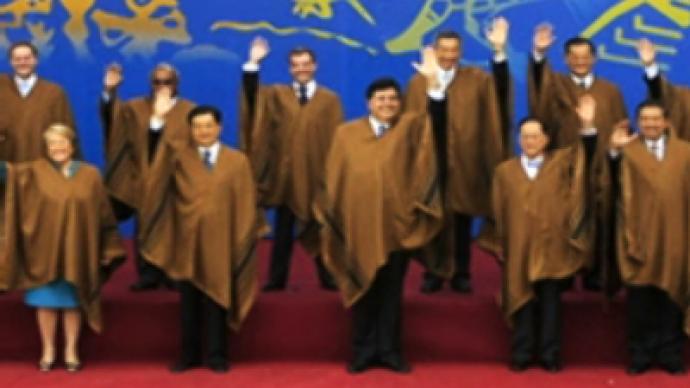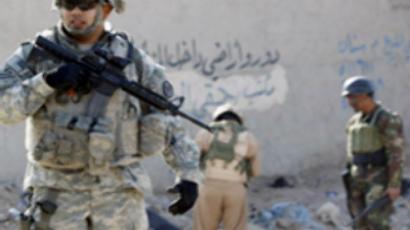Tuesday’s press review

Tuesday's Russian newspapers report on the APEC summit in Lima and ask what else can be done to tackle the global financial crisis.
ROSSIYSKAYA GAZETA writes that the world financial crisis concentrated the minds of the participants at the recent economic cooperation summit: Asia-Pacific nations (APEC). The paper says the majority of the G20 countries are also in the Asia-Pacific region, so the Lima summit was a natural extension of the Washington summit of the grouping. The paper quotes the Russian President, Dmitry Medvedev, who summed up the gathering thus: ‘The summit that happened here became a continuation of the Washington summit.’
The President, writes the paper, said that before Washington he had no high hopes for that summit to happen at all, to say nothing of its results. However, continues the paper quoting the President, ‘Not only the summit happened but the documents adopted there answered the hopes of all the delegations.’ In Lima, Peru, says the paper, some of the statements made at the Washington summit were put into a more detailed form. Chief among them was that none of the members of the G20 present at the APEC summit is satisfied with how the International Monetary Fund is playing its role in the prediction of crises and in crisis management. It is a common sentiment now, that the IMF should be reformed, says the paper.
IZVESTIA writes that during the last session of the Lima summit the participants adopted a final document – a special statement on the World financial crisis, and set a deadline for it: the crisis should be overcome within 18 months. The paper says, however, that most of the participating national leaders were less optimistic during the coffee break conversations with their teams: most gave the crisis two years rather than a year and a half. Russian President Medvedev, continues the paper, decided to abstain from any predictions at all.
Asked about the rejection of protectionism as a principle adopted by the leading World economies for the next twelve months, the Russian President responded that there is a difference between dumb protectionism and the necessary protection of the domestic producer. The paper says one of the best examples here is the Russian automobile industry, protected today by high import tax on foreign brands. The paper quotes the President saying that, while rejecting dumb protectionism, which damages the World economy, ‘no leader will ever deny protection to the real sector of the national economy.’
KOMSOMOLSKAYA PRAVDA says during the APEC summit in Lima the Russian President urged his colleagues not to be egotistic during the World financial crisis. The paper also says that at the news briefing after the summit, apart from the crisis-related questions and the definition of protectionism, President Medvedev talked to the media about his hopes for some flexibility in the U.S. position on the Eastern Europe-based missile defense system, so Russia would not have to go into the same inflexible mode about deploying its own missiles off Kaliningrad.
VREMYA NOVOSTEI says that the participants of the APEC summit in Lima firmly decided to overcome the World financial crisis within 18 months. The final document of the summit, writes the paper, admits that this crisis is the biggest since the times of the Great Depression but insists that it can be fought and conquered. The paper continues: ‘The summit also touched on the reform of the World financial institutions, but no concrete detailed program was suggested.’
The final document, says the paper, only brought the World’s attention to the fact that the future structure and architecture of a reformed IMF should reflect the real and growing influence of the developing economies on the World’s financial situation. The paper also says that the summit hasn’t neglected regional matters altogether: the package of the usual APEC decisions to further strengthen Asia-Pacific cooperation in the fight against corruption, terrorism, organized crime and climate change were all duly suggested, edited and adopted.
MEZAVISIMAYA GAZETA writes that Washington and London are preparing to launch new countermeasures against the growing financial crisis. The paper says Barack Obama’s new cabinet, or rather the part of the cabinet that is already in working mode, is preparing a 500 billion-dollar package of tax incentives and budget infusions for the U.S. economy, while the British government is ready to lower VAT from 17.5% to 15%, the lowest rate possible under EU regulations. Apart from that, Britain plans to lift the income tax for incomes over 150,000 pounds a year to 45%.
The paper says the Russian Government has so far been fighting the crisis with direct infusions from the Stabilization Fund, but some experts doubt that this policy could last long and that no other measures are required. The paper asks, quoting Russian experts: ‘Maybe it is time for our Government to start thinking about tax incentives too?’
Evgeny Belenkiy, RT














